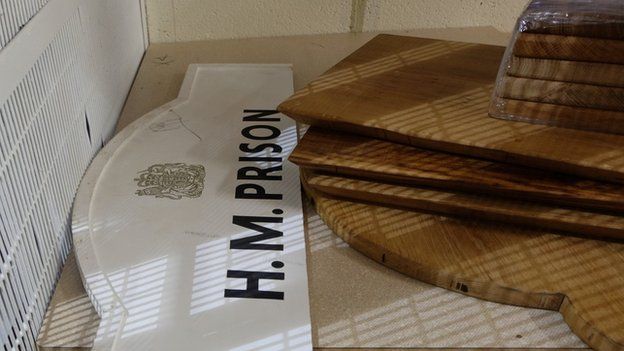Chopping boards made behind bars
- Published

Sewing mailbags amidst the shadows of a forbidding grey monolith, the traditional Dickensian image of a prison workshop, is a mixture of harsh conditions and monotonous tasks, but how does that match up to the reality of UK prison labour in the 21st Century?
HMP The Mount opened in 1987 - the modern red-brick building is a category C training prison on the outskirts of Bovingdon village, Hertfordshire.
It runs various work and training schemes, including manufacturing wooden chopping boards and kitchen display units for a local company, Rough Stuff Oak. The company sells the majority of its products to High Street restaurants and catering companies such as Carluccio's and Nisbets.
On a cold December morning co-founder Matt Cannon is in a philosophical mood. Sitting in the waiting room prior to running the ID gauntlet, he describes his relationship with the prison.
"It's pretty challenging. If something happens in the prison, we can't be told for security reasons. So, for example, if there's a lockdown we won't be told when it's happening, why it's happening or when it'll end. There's complete radio silence and when we call the prison they can't tell us anything."
Lockdowns and other incidents can mean production stops for days, sometimes weeks.
"When we sign contracts with our customers, we make it very clear that the production is in a prison and that this will mean unexpected disruptions. Most of them are very understanding," he says.
"One big restaurant chain had an order of 2,000 chopping boards and we explained that they wouldn't be ready. As a general policy we try to build in extra time to fulfil orders."
The company wants to expand but this is fraught with problems.
"We've outgrown our existing workshop and have moved to a new one. This relocation would have been difficult enough in the normal world but doing it within a prison is even more complicated. What should have taken two weeks has taken over two months and we still don't have phones or computers in the workshop."
The enterprise is a logistical nightmare to run and every day presents new problems. It begs the obvious question.
"Why do we do it? There are lots of reasons. We want to do something good and make a difference. Also, from a marketing perspective the fact our products are made in prison does differentiate us."
After several security checks it's a short walk to the workshop. Woodturning machinery runs at full pelt as the inmates put the final touches to chopping boards and display units.
"Before I came to prison I was working with wood, fitting flooring and so on. This'll boost my skills and will hopefully help with starting my own business when I leave prison," says David, who was convicted of armed robbery.
He and the other prisoners are paid £20 a week and can spend the money on items such as phone cards and toiletries.
Dipak, serving a seven-and-a-half-year sentence for a drug offence, says that working staves off the boredom of prison life.
"It's my first time in jail and I don't know how I'd cope without something like this to do. It helps you stick to a routine and keeps some focus in your life."
But working with people serving time can pose problems and Steve Briggs, the workshop instructor, is realistic about his workforce.
"There are some violent people in here and security is very tight," he says.
"Most of the equipment is big, heavy machinery which you can't move, but if for example an inmate is using a screwdriver we have a signing in and signing out system. Each tool has a number which is displayed on a board with the prisoner's name on it."
Rough Stuff pays the prison commercial market rates for the manufacturing. So what happens to the profit?
Prison governor Steven Bradford explains that the Mount is a state-run prison and that any money made is counted as income.
"We view ourselves as a community prison and that includes working with local businesses, helping them grow," he says.
"In return for that, they invest in offenders by providing meaningful work and qualifications. The money we make from the contract is invested back into the business. So we'll buy new machinery and we also offset staff costs because I have to pay the workshop instructors."
He says the workshop is about both rehabilitation and managing the prison population.
"We think it's important that prison is seen as a place of change and we try to do something positive with inmates while they're in custody. We want to persuade them to change their lives for the better.
"If we succeed, it benefits not only the individual offender but also their families and the wider community."
For more on this story listen to The World Tonight on BBC iPlayer.